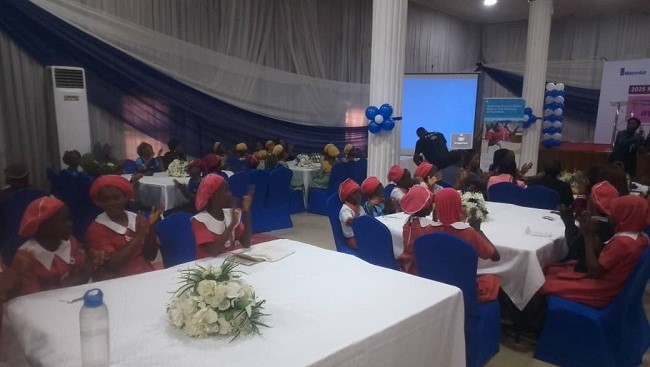WaterAid Nigeria is demanding that menstrual health is recognised as a human right and not a privilege. The organisation is therefore urging governments, schools and communities to break the silence around menstruation and challenge harmful taboos to ensure that every girl and woman can manage her period with dignity, confidence and in a safe manner.

Evelyn Mere, Country Director of WaterAid Nigeria, made the call in Lagos on Thursday, May 29, at an event commemorating the 2025 Menstrual Hygiene Day.
She said: “Every day, millions of people who menstruate face stigma, shame and health risks due to a lack of basic menstrual hygiene facilities and knowledge. Despite being an education and gender equality issue, millions of women and girls in Nigeria still lacked access to basic water, sanitation, and hygiene (WASH) services, as well as accurate information and safe spaces to manage their periods. “This reality contributes to keeping girls out of school and preventing women from participating fully in daily life.”
According to the 2021 WASHNORM survey, only about 46% of Nigerians have access to basic sanitation services, and just 13% use improved sanitation facilities with proper handwashing stations. For menstruating girls and women, this gap means exposure to shame, infection, and stigma, often with lifelong consequences.
“It is unacceptable that menstruation continues to limit the potential of millions of girls and women in Nigeria. No one should miss school, feel ashamed, or be unsafe simply because they are menstruating. A period-friendly world is one where dignity, access, and rights are protected for everyone, regardless of age, location, or income,” she stated.
In his submission, Dr. Adebayo Alao, Head of Lagos Programme, WaterAid Nigeria, who gave an overview of WaterAid’s work, stated that in partnership with schools, health institutions, communities and government at national and sub national levels, WaterAid Nigeria is implementing menstrual health and hygiene management (MHHM) interventions that include the provision of WASH facilities in schools, setting up of hygiene clubs, production and distribution of reusable pads, and community sensitisation efforts.
These initiatives, according to the Head of Lagos Programme of WaterAid, are designed to foster supportive environments where menstruation is normalized and no one is left to choose between managing their period and living their life with dignity.
“This Menstrual Hygiene Day, apart from investing in behavioural change and community education to tackle harmful norms, WaterAid Nigeria is renewing its call to integrate menstrual health into national and subnational wash, health, gender and education policies, prioritize inclusive and climate resilience wash facilities and menstrual services in schools and public places as well as challenge menstrual stigma through community engagement and advocacy,” he stated.
Mahmood Adegbite, Permanent Secretary, Office of Drainage Services, Lagos State Ministry of Environment and Water Resources, noted that the event is not just about raising awareness for menstruation, it’s about breaking silence, ending stigma while ensuring dignity, good health and equality for millions of girls and women around the world.
According to him, menstruation is a natural part of life, yet it remains stigmatised and often misunderstood. Many women and girls face challenges due to religious and cultural myths, lack of access to clean water, sanitation facilities and affordable menstrual products.
“Through this event, we aim at raising awareness about menstrual hygiene and its importance. We will promote education and dialogue about menstruation and advocate for policies and programmes that support menstrual health hygiene. Improving menstrual hygiene and providing access to affordable menstrual materials can help improve girls’ and women’s access to education, opening more options for jobs, promotions, and entrepreneurship, thus unleashing female contributions to the overall economy, rather than keeping them at home,” he submitted.
In her remarks, Atinuke Wuraola Owolabi, Chairman Lagos Chapter of Association of Professional Women Engineers of Nigeria (APWEN), called for a collaborative effort in advocating for access to safe, affordable menstrual products.
She also charged stakeholders, policymakers, health advocates, parents and guardians to build clean and private WASH facilities in schools and public spaces. They must design and implement inclusive policies, lend their voices, educate and offer their support on all issues relating to the girl child at all times.
“Menstrual health is a right, not a privilege and ensuring access to it is a collective responsibility,” she stressed.
May 28 every year is a date set aside by the United Nations where a very critical aspect of womanhood is usually celebrated, and it is aimed at breaking the barriers for menstrual health equity.
Highpoint of the event was the presentation of menstrual hygiene kits to some of the students in attendance.
Dignitaries at the event included Dr. Abimbola Mabogunje, Permanent Secretary, Health District VI; and Dr. Omobolaji Gaji, Permanent Secretary, Office of Environmental Services, Ministry of the Environment and Water Resources, among others.
By Ajibola Adedoye
